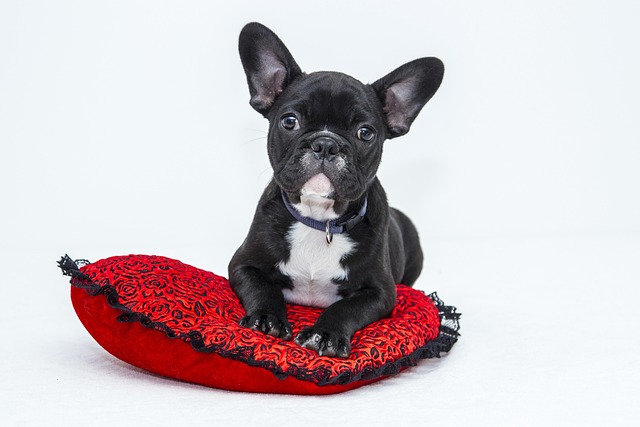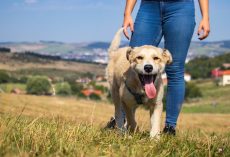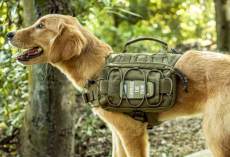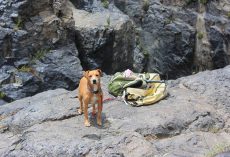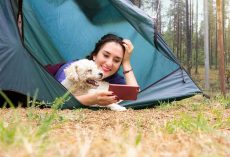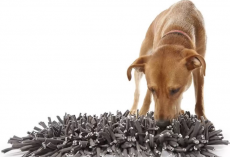Adopting an older rescue dog who isn’t house-trained yet can feel a little intimidating — but don’t worry. Many rescues come from backgrounds where they’ve never lived in a real home, so they truly don’t know the rules yet. It’s not their fault — they just need guidance, structure and patience.
With the right approach, your new family member can learn exactly where the bathroom is.
Train them the same way you would any dog. Create a schedule for food and water, plan well-timed outings, and have a ton of patience!
Check out the best tips for house-training rescue dogs below:
When to Take Your Dog Outside
Your rescue may need a potty break within 5–15 minutes after:
- Eating or drinking
- Waking up from a nap or the night
- Playing, training, zoomies or meeting another dog
Think of it just like housetraining a puppy — the same rules apply.
1. Supervise Anytime They’re Free-Roaming
A rescue who isn’t housebroken can’t have full freedom yet if you want to protect your floors.
- Keep your eyes on them at all times when they’re loose indoors.
- Watch for early signs they need to go: sniffing around, circling, wandering off, or suddenly leaving the room.
- If you want them nearby but can’t supervise closely, Semel recommends clipping their leash to your belt loop.
A few seconds of distraction is all it takes for an accident.
2. Confine Your Dog When You’re Gone or Can’t Supervise
Just like puppies, untrained rescues benefit from safe confinement.
- A crate or pen prevents accidents and keeps your dog safe when alone.
- When introduced properly, crate training is humane, effective and comforting for many dogs.
- Never use the crate as punishment (short time-outs are fine).
It's also important to avoid long periods of isolation. Too much alone time can lead to:
- Hyperactivity
- Destructive chewing
- Digging
- Self-harm
- Excessive barking
How long can they stay crated?
- Young puppy: start with 2 hours (when tired), build to 4
- Adult dog: 4–6 hours if well-exercised beforehand
- More than 6 hours isn’t recommended without a break
3. Praise & Reward Immediately When They Go Outside
The moment your dog goes in the right place, celebrate!
- Offer excited praise and a high-value treat right away.
- Delayed rewards don’t work — they must connect the treat to the action they just did.
- You can also use a cue word like “go potty” or “get busy” said once right before they start, to teach them to go on command.
Pro tip:
Don’t end the walk immediately after they poop or pee. That teaches dogs to delay going so the walk lasts longer.
4. Use an Enzyme Cleaner to Remove Accidents
Your dog will likely have a few indoor accidents — totally normal.
Use an enzyme-based cleaner (like Nature’s Miracle) to fully remove the smell.
If you don’t, your dog may keep returning to the same spot because they can still smell their own urine.
5. Remove Water About Two Hours Before Bed
Semel recommends picking up the water bowl roughly two hours before bedtime — unless your dog is very thirsty or it’s extremely hot out. This helps reduce overnight accidents.
6. Never Punish Accidents
No scolding. No yelling. No “rubbing their nose in it.” Ever.
Never discipline your dog for house-soiling accidents, whether you saw them happen or not.
Punishment only teaches your dog to be afraid to go near you when they need to eliminate — and can make accidents more frequent and harder to fix.
Your rescue has been through enough already. They need kindness, not intimidation.
7. Never Discipline Submissive or Excited Urination
Some dogs pee a little when they’re nervous, excited or approached by strangers. This is involuntary — they can’t control it.
Common triggers include:
- Eye contact
- A stranger bending over them
- Loud or excited voices
- Reaching toward their head
- Fast movements
Punishing this makes the behavior worse and increases their anxiety.
With Patience, Your Rescue Will Get There
House training a rescue takes consistency and compassion. Some dogs need to “unlearn” old habits before they can learn new ones.
Undoing and reteaching can be harder than teaching from scratch. Stay calm, understand the situation and don’t expect miracles overnight.
If housetraining seems unusually difficult, talk to your vet — some medical conditions can make it harder for dogs to hold their bladder.
With structure, patience and plenty of reassurance, your rescue dog can absolutely master housetraining and settle happily into your home.
We independently pick all the products we recommend because we love them and think you will too. If you buy a product from a link on our site, we may earn a commission.

